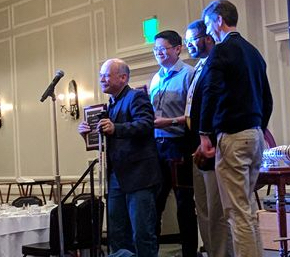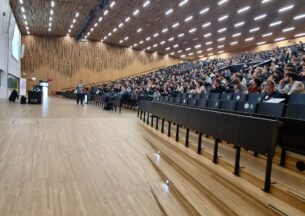Group Including Prof. Ben Zhao shares ASPLOS award for most influential paper

In the year 2000, data was still largely stored and moved around on physical media, and transferring a file over the internet was a slow and painful process. The idea that someday users would store their files at a remote data center, accessing it on demand from wherever they take their laptop or phone was practically science fiction.
Yet that prophetic vision was the subject of a 2000 paper co-authored by UChicago CS faculty Ben Zhao, which last month received the Most Influential Paper award at the ACM International Conference on Architectural Support for Programming Languages and Operating Systems (ASPLOS).
In the paper, by a group at the University of California, Berkeley led by John Kubiatowicz, the authors proposed OceanStore, a global storage service “designed to span the globe and provide continuous access to persistent information.” Much of the infrastructure and applications — such as email, calendars, and scientific repositories — described within the article accurately predict the cloud services threaded throughout our online lives today, but were considered unlikely by many readers at the time of writing.
“The idea that you could basically pay someone for storage and put it on the internet and have it be managed and highly robust and no matter what you do it’s always there…back then, it was insane,” Zhao said. “People said ‘you’re crazy, nobody will ever pay someone else for storage. Why would you trust your data to some random server out there in the wild?’ As far as papers go, it was pretty visionary.”
While eerily prescient on many details, some proposed aspects of OceanStore haven’t been implemented as of yet. The authors envisioned distributed data storage rather than the massive, centralized data centers used by Google, Amazon, and other cloud providers, with files diced up into millions of chunks and scattered across the internet, not unlike peer-to-peer sharing protocols such as BitTorrent. The idea, Zhao said, was that your data would follow you from place to place, migrating through the network to be nearby for easy and fast access — a model that may not make sense in the current cloud computing industry.
“We didn’t get the economic model right, the sense that Google and Facebook now dominate the internet,” Zhao said. “There is probably a version of OceanStore that can be built for Facebook or Google Drive, for example, but much of it would be hidden under the covers.”
The paper, “OceanStore: An Architecture for Global-Scale Persistent Storage,” was co-authored by John Kubiatowicz, David Bindel, Yan Chen, Steven Czerwinski, Patrick Eaton, Dennis Geels, Ramakrishna Gummadi, Sean Rhea, Hakim Weatherspoon, Westley Weimer, Chris Wells, and Ben Zhao. It originally appeared in Proceedings of the ninth international conference on Architectural support for programming languages and operating systems.
The award capped a busy week for UChicago CS at the late March conference in Virginia, where faculty and students also presented five papers (10 percent of the total program) and professor Fred Chong delivered a keynote address on the current state of quantum computing.













